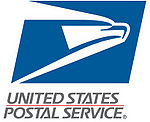United States Postal Service
 From Conservapedia
From Conservapedia The United States Postal Service (USPS) is a government corporation responsible for providing mail delivery to individuals and businesses within the United States. Americans often refer to it as the "Post Office" (it took its current name in the 1970's, though the name still technically refers to an individual USPS location and is still used in marketing). Its creation was specifically authorized by the Constitution[1] and it has the ability (through the Postal Regulatory Commission) to regulate the provision of all mail services in the US. Currently, the USPS has a monopoly on "first-class mail" (common mail such as letters and bills). This monopoly has come under fire, especially as the Postal Service has posted severe financial losses and raised rates as a result of the increasing cost of employee benefits.
"The U.S. Post Office is the only entity allowed by federal law to deliver first class mail to your mailbox. In fact, Fedex and UPS are strictly prohibited from delivering "non-urgent" letters".[2][3]
The USPS is part of the core infrastructure of America. For example, the USPS, along with UPS and Fedex, are part of the modern Just in Time food distribution system used by companies like Wal-Mart, Costco and Amazon.com, which includes transportation (trucks, ships, railroad, and airplanes), warehousing, and retail facilities which move food from the food production system to consumers. Without the USPS infrastructure such modern retail and online commerce would not be possible or cost effective.
The USPS has a large number of support staff (custodians, office workers, computer operators, mechanics ) in addition to the operations staff who are directly responsible for collecting, sorting, distributing and delivering the mail
- Mail is delivered by City and Rural Carriers
- Mail is sorted by Mail Handler and Mail Processing Clerks
- Mail is distributed by Motor Vehicle or Tractor-trailer Operator (driver). Distribution in this case means transportation between post offices or mail processing centers.
- There are also clerks at smaller Post Offices who perform a mixture of duties.
Mail is handled according to a category, such as general letter, media mail, postcard or package. Each category has restrictions on content, weight, dimensions and is charged accordingly. Although the USPS Inspector General checks scales and other measuring devices for accuracy, federally owned post offices are exempt from the state inspections that private companies are subject to. Private companies' measuring devices are typically inspected regularly by an internal department within the company and at least once a year by individual states' bureau of weights and measures, often a division of that state's department of agriculture.
Contents
2020 presidential election[edit]
- See also: 2020 Presidential election, Blue State Civil War, and Voter fraud
In August 2020 it was reported that Facebook was planning for the possibility that President Trump or his campaign could try to challenge mail in ballot election results. The New York Times reported that staffers were already putting together contingency plans in the event Trump tries to use Facebook to dispute the vote by declaring the U.S. Postal Service lost mail-in ballots or that other groups interfered with the vote. Facebook officials, including CEO Mark Zuckerberg, were holding daily meetings to discuss how to minimize the platform from being used to cast doubts on the results.
The Times noted that one plan would include a “kill switch” to shut down political ads after Election Day. The company officials believe the ads, which Facebook does not check for truthfulness, could be used to disseminate misinformation.
The newspaper said YouTube and Twitter also discussed their own plans if the postelection period becomes problematic.[4]
Internet Covert Operations Program[edit]
Th Post Office operates a program known as the Internet Covert Operations Program (ICOP).[5] U.S. Postal Inspection Service (USPIS) agents monitor Facebook, Parler, Twitter, and Telegram for "significant activity regarding planned protests occurring internationally and domestically" as part of a rally for freedom and democracy .As part of ICOP, United States Postal Inspector agents "assume fake identities online, use sophisticated intelligence tools and employ facial recognition software. These tools include Clearview AI's facial recognition database, which contains more than 3 billion images scraped from social media and other public websites, and Zignal Labs' real-time keyword search software. Information from iCOP analysts was distributed through Homeland Security fusion centers to a wide array of law enforcement units and government authorities, as well as stored for future access. "The retention and dissemination of these reports could allow federal agencies to receive information they are not allowed by statute to collect themselves," Winter suggested, according to Jana Winter of Yahoo News.[6]
See also[edit]
- Fedex and UPS
- Supply chain and Just in Time distribution system
- Wal-Mart and Costco
- Food distribution system: Transportation (trucks, ships, railroad, and airplanes), warehousing (such as Amazon.com, Costco), and retail facilities (such as Wal-Mart) which move food from the food production system to consumers.
- Systems of support
References[edit]
- ↑ "Article I, Section 8, Clause 7". The U.S. Constitution. Accessed 15 January 2010.
- ↑ Cooper, Rory. Obamacare: The “Post Office” of Health Care Plans. Heritage Foundation. 11 August 2009. Accessed 15 January 2010.
- ↑ Hawkins, John. Our Health Care System Is Going To Be Like The Post Office?. Right Wing News. 12 August 2009. Accessed 15 January 2010.
- ↑ https://www.newsmax.com/politics/facebook-election-results-dispute-social-media/2020/08/21/id/983301/
- ↑ https://news.yahoo.com/facial-recognition-fake-identities-and-digital-surveillance-tools-inside-the-post-offices-covert-internet-operations-program-214234762.html
- ↑ https://news.yahoo.com/facial-recognition-fake-identities-and-digital-surveillance-tools-inside-the-post-offices-covert-internet-operations-program-214234762.html
External links[edit]
Categories: [United States Government Agencies] [Government] [Retail] [Transportation] [Systems of Support]
↧ Download as ZWI file | Last modified: 02/03/2023 15:11:12 | 135 views
☰ Source: https://www.conservapedia.com/United_States_Postal_Service | License: CC BY-SA 3.0
 ZWI signed:
ZWI signed:
 KSF
KSF